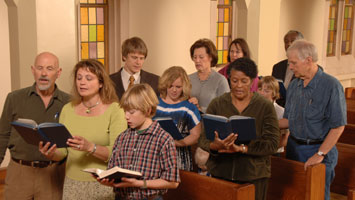I was reading an email the other day from a minister that encourages preachers and teaches preaching styles. The author in a list of his essential books for preaching said about his second choice: “It is a repository of the greatest thoughts in Christian history. I’m talking about the preacher’s secret weapon. I’m talking about the one book that many of you are not using as much as you should. I’m talking about the one book that you need to have after you have a Bible. I’m talking about the Hymnal. Yes, the Hymnal.”
Paul knew the power of singing hymns: “About midnight Paul and Silas were praying and singing hymns [Gk: humneo] to God, and the prisoners were listening to them, and suddenly there was a great earthquake, so that the foundations of the prison were shaken. And immediately all the doors were opened, and everyone’s bonds were unfastened” (Acts 16:25-26 ESV). Glory! One hymn that I no longer hear in church was written in 1863 by Edwin Hodder and paints comparative pictures in every verse about the Word of God. There are seven verses in my copy of the Redemption Hymnal, so here are just a few: Thy Word is like a garden, Lord, With flowers bright and fair, Thy Word is like a deep, deep mine, And jewels rich and rare, Thy Word is like a starry host; A thousand rays of light In our recent series of blogs on how to enjoy your Bible, I have tried to show that your Bible is truly “like a deep, deep mine” and encouraged you to find the “jewels rich and rare” that are still there for the finding. In another book in my library, The Structural Principles of the Bible, the author F.E. Marsh, an English Baptist preacher from about a century ago, writes that the Word is “like the organism of the human body in its vitality…. The words of the Bible are living in their essence, and life-giving in their ministry, hence, ‘the words’ are ‘the words which the Holy Spirit teacheth’ (I Cor. 2:13); ‘the words’ which Christ spoke ‘are spirit and life’ (John 6:63).” “Taking the Bible as a Living Organism, we may use the human body as a model for our theme; and as we do so we shall find– And there we see “the whole body, joined and held together by every joint with which it is equipped, when each part is working properly, makes the body grow so that it builds itself up in love” (Ephesians 4:16 ESV). And there we have the 12 chapters from F.E. Marsh’s book, which you can still purchase online. I won’t loan my copy, as Christians are such good bookkeepers! You can find some extracts on our site as Articles under “F.E. Marsh.” I highly recommend this book to anyone who loves the Bible. Yet again I must write: Read what is written, and then pause and think about the precision and beauty of God’s Word to you. “Man shall not live by bread alone, but by every word that comes from the mouth of God” (Matthew 4:4 ESV). You might remember those… a book with lyrics and music of the great hymns of the church, now sadly replaced by big screens. And now not every Christian home has one, as was the norm. My generation has hymnals, though, and I have plenty of them. “Speaking to one another in psalms and hymns
You might remember those… a book with lyrics and music of the great hymns of the church, now sadly replaced by big screens. And now not every Christian home has one, as was the norm. My generation has hymnals, though, and I have plenty of them. “Speaking to one another in psalms and hymns 
And every one that seeks may find A lovely garland there.
Are hidden in its mighty depths For every searcher there.
Are seen to guide the traveller, And make his pathway bright.
The Body of a United Organism.
The Head of a Golden Wisdom.
The Spirit of an Intellectual Individualism.
The Soul of a Breathing Life.
The Heart of a Loving Purpose.
The Hands of a Working Design.
The Mouth of a Specific Utterance.
The Lungs of a Double Action.
The Ears of a Perpetual Attention.
The Feet of a Progressive Direction.
The Eyes of a Prophetic Outlook.”



Really enjoyed this article. I have put the book in my Amazon cart.
Question- I was looking around for a book Peter wrote awhile back.
“I’m Excited About Ephesians.” I am reading the Colossians book.
Has anyone thought about distributing some of his books that are out of print as E-Books? If you know where I could find the Ephesians book, let me know. Thanks, Allen
Thanks, Allen. You might find secondhand copies of “Exciting Ephesians” on Amazon or Abebooks or similar. The books is in the middle of being completely revised and will be published as “I’m Excited About Ephesians” in 2016. Blessings, Peter